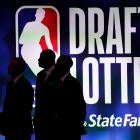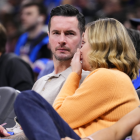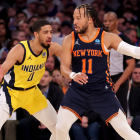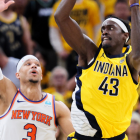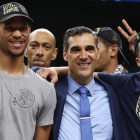When the Pelicans traded with the Bulls for Nikola Mirotic in February, it was seen as a hand-wave move. DeMarcus Cousins had been lost for the season several days prior with a torn Achilles, and the best part of the deal for New Orleans was getting Omer Asik's nightmare contract through 2020 off the books. The move added a big body to the roster, but it shouldn't have done much to shake up the Western Conference playoff picture with the Pelicans' second-best player out for the season.
It shouldn't have. And yet, here we are, with the Pelicans up on the Portland Trail Blazers 3-0 behind some of the best role-player play that Anthony Davis has ever had. After months of carrying the Pelicans, Davis finally looks like he has a team, and he's making the most of it. Make no mistake, the Pelicans aren't a better team without Cousins, and this isn't to imply that. But the way Gentry has coached this team around the talent he has -- running a pick-and-roll offense with Rajon Rondo and Davis that has to be respected -- Mirotic is the perfect weapon. Every time the Pelicans have run the pick and roll, they have had someone on the perimeter. And more often than not this series, it's been Mirotic.
After Mirotic came back to the Bulls from head and face injuries sustained in a fight with then-teammate Bobby Portis, his situation there was untenable. The Pelicans, meanwhile, had to unload Asik's contract and some veteran weight from the roster. With that in mind, the Bulls traded Mirotic for Asik, Jameer Nelson, Tony Allen and a first-round pick. In reality, the trade was for the Bulls to take Asik's contract and get a first-round pick. Anything else would have been lagniappe.
With the Pelicans, Mirotic didn't light up the scoreboard, and his shooting was pedestrian, especially from deep. With five game left in the season, Gentry took a risk: He put Mirotic in the starting lineup over Emeka Okafor. Over those five games, Mirotic's numbers increased across the board, and he put up a plus-minus of +98, or +19.6 points per game. The reason came down to scheme fit. The pick-and-roll offense is perfect for a stretch-four like Mirotic, and it's paid dividends for the Pelicans this postseason.
In the playoffs, Mirotic is third in three-pointers made at 11, trailing only Paul George (12) and Klay Thompson (13). He's second in attempts at 23, trailing only Damian Lillard (25). He's averaging 21 points per game -- including 30 in a landslide Game 3 win over the Blazers in the rowdiest playoff game that Smoothie King Arena has ever seen -- and he's shooting 47.8 percent from deep. It looks like chucking, but with every bucket Thursday night, the home crowd lost its mind. And it seems like every shot he makes is killing a run from the opponent. His postseason has been one long heat check, and he is scorching right now.
More than his offensive prowess, Mirotic has been a two-way player this series. His defense alongside Anthony Davis has been impenetrable, and their presence inside has allowed Pelicans guards to give Lillard fits with traps at the top of the key. Mirotic has 2.3 blocks per game this series, seven total (second only to Anthony Davis' eight this postseason), with four of them coming in Game 1. Active hands is the modus operandi of the Pelicans' defense -- you can see it every time the Blazers come down the floor -- and Mirotic has bought in. He had three steals in the Pelicans' Game 3 rout, putting him at five for the series. His nine rebounds per game (27 total) are also a nice complement to Davis' 12.7, and it allows the Pelicans to control the paint.
If Mirotic keeps up this shooting consistency, this is dangerous territory for NBA teams. The Blazers have tried everything to stop the Rondo-Davis pick and roll, and nothing has worked. If they double down on Davis, Rondo gets a lay-up. If they double-up Rondo or switch, Rondo throws an alley and Davis throws down the oop. If they send help down, Rondo kicks it out to E'Twaun Moore, Jrue Holiday or Mirotic and they bury a three. The Blazers' frontcourt simply hasn't been good enough to deal with two excellent Pelicans' bigs, and no matter how creative they get on defense, there's always a mismatch.
Mirotic cooling off may be a concern, but his percentage was way down coming off the Pelicans bench because he doesn't work with players like Ian Clark, Darius Miller, Cheick Diallo and Solomon Hill. As good as he's been, Mirotic is used best in a complementary capacity. Confidence in his shot isn't an issue, but teams won't respect the Clark-Diallo pick and roll, so Mirotic's shots come more contested. That isn't meant as a knock on Mirotic; it's more of a testament to Gentry's ability to recognize that and use him as he should be used. If Mirotic is the primary threat, it mitigates the threat.
But the biggest thing Mirotic is doing right now is taking some of the pressure off Davis. Davis hasn't been the team's leading scorer in the past two games, and that's allowing him to keep contributing in other aspects of the game. He looks faster on defense, his shots don't look as forced, and more than anything else, he looks like he trusts his teammates. He's being allowed to play as a "traditional" big, and despite his versatility, that's where he thrives.
Even if Mirotic doesn't put up 30 per game, the 15-20 points he was putting up in Games 1 and 2 were enough to get wins over a very good Blazers team. But if Mirotic does go off, routs like the ones that we saw in Game 3 are the result. The Pelicans were firing on all cylinders. And it looks like Davis finally doesn't have to strap this team to his back to grind out wins.














